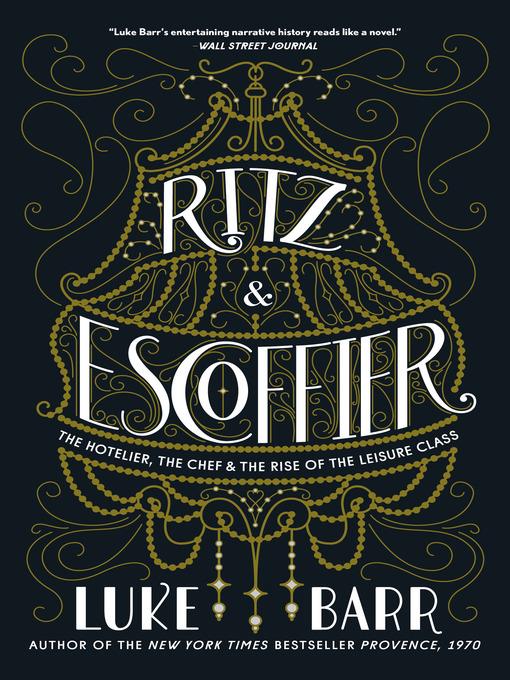
Ritz and Escoffier
The Hotelier, The Chef, and the Rise of the Leisure Class
کتاب های مرتبط
- اطلاعات
- نقد و بررسی
- دیدگاه کاربران
نقد و بررسی

January 15, 2018
A new perspective on the rise of the leisure class.In his latest book, former Travel + Leisure features editor Barr (Provence, 1970: M.F.K. Fisher, Julia Child, James Beard, and the Reinvention of American Taste, 2013) dives into the many aspects of the restaurant industry during the belle epoque era that laid the groundwork for today's fine-dining experience. The author focuses on the unlikely union of two entrepreneurs: Swiss hotelier Cesar Ritz (1850-1918) and French chef Auguste Escoffier (1846-1935). The two men shared an insatiable appetite for culinary success, but it wasn't just the food they were concerned about. By working together to bring the now-renowned Savoy Hotel to its current glory, Ritz and Escoffier introduced epicurean principles to a general public that had no point of reference to understand such lifestyles. "The nouveaux riches had arrived," writes Barr, "but until now, there had never been anywhere for them to go to announce their arrival. They had rarely been invited to the exclusive dinner parties or private clubs of high society. But now there was the Savoy. The restaurant may have served the most refined, daring, and sometimes shockingly expensive food in the world, but it was not exclusive....The Savoy offered a new and democratic kind of luxury, and cooking was very much at the center of it." In this process, Ritz and Escoffier created a whole new breed of city dwellers dedicated to "a life of pleasure, a theater of luxury." The two would later go on to create the Hotel Ritz in Paris. As in his previous book, it's clear that Barr has done extensive research to master his topic, and the book serves as an expansive resource for those interested in learning more about the turn-of-the-century leisure class. However, the never-ending name-dropping becomes distracting and tiresome. The story would have benefited from more social and cultural analysis and fewer fabulous cameos.A well-researched, glitzy, and flawed history of conspicuous consumption.
COPYRIGHT(2018) Kirkus Reviews, ALL RIGHTS RESERVED.

January 29, 2018
In this entertaining culinary history, Barr (Provence, 1970) narrates the lives of the two men responsible for democratizing high-end dining at the turn of the 20th century. In 1889, Richard D’Oyly Carte, an impresario known for his work with Gilbert and Sullivan, opened the Savoy Hotel in central London. The Savoy was intended to fill a new niche: luxury available to anyone who could pay for it, as opposed to being confined to the aristocracy. To this end, D’Oyly Carte hired César Ritz, a fashionable hotelier, and the renowned chef Georges Auguste Escoffier. Barr follows Ritz and Escoffier through the years of their professional partnership, during which the Savoy redefined both hotel service and French cuisine (Escoffier established a new kitchen ethos: “respect for the chef, respect for the ingredients, respect for the artistry of cooking”). Financial scandals (D’Oyly Carte kept from the shareholders the high salaries paid to his staff) and personal squabbles lend drama to the narrative, and nearly every celebrity of the era plays at least a bit part. Barr’s prose is lively and his sourcing impeccable, even if he takes liberties in ascribing thoughts and feelings to his characters. Barr offers a thoroughly enjoyable look into a defining moment of culinary history.

March 15, 2018
César Ritz (1850-1918) and Auguste Escoffier (1846-1935) first met in the mid-1880s while working together in Monte Carlo. Both had grown up poor; throughout his life, Ritz cursed his "peasant hands." Temperamentally, they were polar opposites. Ritz was extroverted and a natural showman, while Escoffier was calm and introverted. But together, they fashioned an enduring, creative partnership that still resonates today. Ritz was already an hotelier when, in 1890, Richard D'Oyly Carte needed to revitalize the Savoy, his fashionable London hotel. D'Oyly Carte recognized that only Ritz could perform this task, and employed him at a significant salary. Ritz then hired his own team, including Escoffier as the chef de cuisine. Undeterred by a scandal that saw Ritz and his team dismissed from the Savoy, he and Escoffier went on to create new establishments that are still synonymous with luxury. Barr (Provence, 1970) vividly captures the moment when Ritz and Escoffier conceptualized and created a new type of luxury establishment in which the aristocracy, the nouveau riche, and the beau monde mingled freely and easily. VERDICT Barr's highly enjoyable and well-researched book carries the reader into the intimate heart of Ritz and Escoffier's philosophy.--Penelope J.M. Klein, Fayetteville, NY
Copyright 2018 Library Journal, LLC Used with permission.

March 1, 2018
At the end of the nineteenth century, a chef and a hotel manager collaborate to create what will become one of the most famous hotels in Europe. This lively, gossipy account, by the author of Provence, 1970: M. F. K. Fisher, Julia Child, James Beard, and the Reinvention of American Taste (2013), follows ambitious C�sar Ritz, raised in relative poverty in a little village in Switzerland, and aspiring chef Auguste Escoffier, a disciplined and scientific Frenchman, as they are recruited by Richard D'Oyly Carte, who financed Gilbert and Sullivan productions, to take the helm of his new Savoy Hotel in London's theater district. Barr revels in the details of menus and hotel management, indulges in anecdotes about guests such as Sarah Bernhardt and Oscar Wilde, and traces the scandal that developed when D'Oyly Carte's observant wife, Helen, noticed that Ritz and Escoffier were skimming considerable profits from the hotel. His work is not just a fluidly structured dual biography but a provocative history of a turning point in the evolving hotel and restaurant industry.(Reprinted with permission of Booklist, copyright 2018, American Library Association.)

























دیدگاه کاربران